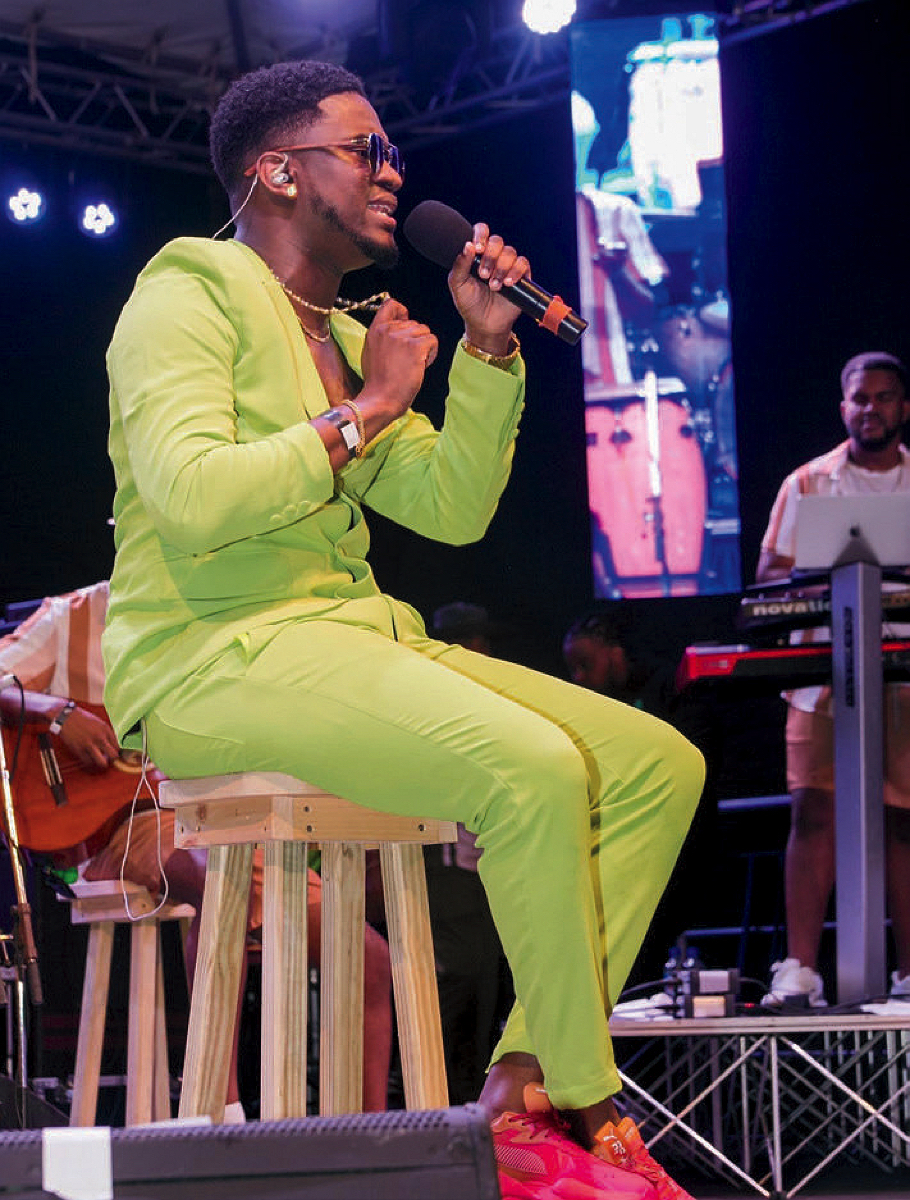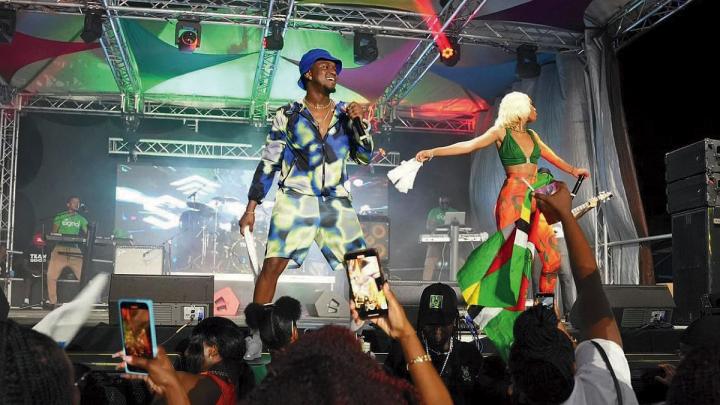On a Tuesday night in February, thousands of revelers paraded through Roseau, the capital of the Caribbean island of Dominica. Some wore the extravagant feather headpieces and sequinned outfits of the day’s costume bands. It was the last night of carnival, the island’s annual celebration of its culture: a colorful, vibrant scene as the crowd weaved through the city. Dancing on a moving music truck, belting out his latest hits, was 28-year-old Sheldon “Shelly” Alfred, M.Arch ’22. His energy belied the fatigue of weeks of carnival season performances. “We getting stronger every day,” the crowd sang along with the popular lead singer of the Signal Band.
The end of carnival meant that Alfred could rest briefly before beginning a tour that would take him across the United States and back to the Caribbean. It’s a busy life, but one that feels like the realization of Alfred’s song from almost 10 years ago, “Take Over the World,” about the global potential of Dominica’s music.
One of the most popular musicians of his generation, Alfred received two “youth of the year” awards in 2022 from Dominica’s National Youth Council, for his contribution to music. That same year, he graduated from the Harvard Graduate School of Design with a master’s in architecture. Now, when he’s not performing, he works as an acoustical consultant, advising clients on buildings’ sound dynamics, a career that allows him to combine two long-term interests.

In some ways, Alfred was destined for the stage. When he was a child, the world outside his home, where he was raised by his mother and grandmother (his father lived on the island of St. Thomas), was filled with sports and sound. “I’m not sure if you can even call it music,” he says with a laugh, “but my friends and I, we made some noise.”
His musical debut came in 2006, at an elementary school calypso competition. A Caribbean art form with roots in Africa, calypso is often called “the voice of the masses”—tackling issues like poverty, crime, racism, and political oppression, with the accompaniment of a live band. Performing as “De Professor,” Alfred presented “Give the Youth a Break,” a song written by a teacher. He won second place. In high school, he was crowned Dominica’s “national junior monarch” for calypso three years in a row. During those years—2009 to 2011—he and some friends formed what would later become the Signal Band. At first, Alfred was its guitarist rather than singer. “Somewhere along my journey, my mom decided that I would take guitar classes during the summer,” he says, “and my dad sent me a guitar. For months we practiced without a band name, with me on the guitar.” Within a few years, the Signal Band was performing before crowds of thousands from Atlanta to Paris. The group has released four albums, most recently 2023’s Déjà Val.
Their music, established in Dominica during the late 1980s, is a genre called “bouyon” (“soup” in French Creole), a fusion of indigenous instruments and musical styles—including calypso and a folk music called jing ping. There is often a deliberate pause between vocals, and an interplay of instruments takes over, as fans dance to the booming beats of the lapo kabwit (goat-skin drums) and the rich notes of the accordion, infused with guitar and electronic keyboard.
“Bouyon was born as a modernization of our traditional instruments,” Alfred says, referring to instruments like the shak shak (a coconut rattle with beads inside), the accordion, and the boom boom (a wind instrument made of bamboo). “As technology emerged,” he continues, “that culture, already rooted in us through traditional instruments, transformed into something more electronic.”
Lyrically, bouyon is about storytelling and the Dominica way of life. It depicts an easygoing people who work the land, embrace the island’s natural beauty (Dominica is known for its mountains, rivers, and rainforest), and appreciate their culture. The first bouyon songs blended Dominica’s French Creole with English. WCK, a band also known as the Bouyon Pioneers, sang of daily life: “Met Veye” (“Keep Watch”) poked fun at nosy neighbors; and “Conch Shell” honored the tradition of shell-blowing, which signaled fishermen’s return with a fresh catch for sale.
“Today it is still about that, but the lyrical content is more direct,” says Alfred, who 10 years ago transitioned from guitarist to singer and, later, to songwriter. “There is no one formula,” he says, describing how he writes. “Some days it starts with bubble diagrams, other days I begin with one word, sometimes I start with a line.…I hardly ever write in one go. I suppose it’s the architect in me, but I can’t help but be iterative with my writing process.”
One important early song was “Ani Ba Yo Love” (“Just Give Them Love”), written in 2017, after Hurricane Maria devastated Dominica. Alfred was in the United States when the storm hit, but his band members asked him to write something that could lift up a country in despair. The song never mentioned Maria by name. “It would be a healing song,” he says, “without being stuck in the box that is the hurricane, or stuck in time.”
“Love is a drug, and we need it to heal the world,” he sang. “Every boy, every girl / Every color, every race / We taking this message of bouyon love / Out to the world.”
The lyrics resonated—in parties, political rallies, national events, and in church. Yet, even as his popularity soared, Alfred headed back to school, to follow what he calls a very “linear” path in architecture. This was a longtime interest: he’d studied building technology in high school and graduated from the Dominica State College with an associate degree in architecture. In 2017, he was Morgan State University’s valedictorian, earning a bachelor’s in architecture and environmental design.
After that, he says, “I did not want to be a musician by night, architect by day.” Instead, at Harvard, he studied architectural acoustics—“the behavior of sound in space”—and now works for an American company, Acentech, providing advice to architects on room acoustics for commercial, residential, and historic buildings. The job allows him to keep growing as a musician. In his newest single, “Stronger,” Alfred sings: “Maybe the journey was a slow one, / Now we in this for the long run.” Looking to the road ahead, the songwriter says, “I do not want my music to be confined by age, time, or location. I just want the music to be free and embraced by generations—by everyone, everywhere.”








